Share
According to a recent report on drug use published by the Substance Abuse and Mental Health Services Administration (SAMHSA), nearly 20 million adults in the United States have a substance use disorder (SUD). However, less than 1.5 percent of people aged twelve or older received treatment in an addiction program (SAMHSA, 2018). Reaching individuals and families affected by SUDs requires help from professionals from multiple places, including social service organizations (SSOs). Although the mission of SSOs is not primarily to address SUDs, clients and families seeking social services often are affected by them. In some instances, a SUD may be the main contributing factor for seeking social services.
This article discusses how Pressley Ridge, a large SSO with programs and services in six states, is addressing substance use issues among clients and families. In this first of two articles, we will review the potential roles of SSOs vis-à-vis substance issues, briefly describe Pressley Ridge programs, and discuss challenges the organization faces in addressing these issues. Our next article will provide more details on how we increased the focus on substance use issues in our organization.
Potential Roles for SSOs Addressing SUDs
The opioid epidemic raised awareness of the many problems caused or worsened by opioid use disorders (OUDs) as well as other SUDs. Multiple organizations and individuals are becoming increasingly involved in addressing SUDs including first responders, police, schools, universities, religious organizations, and SSOs.
The SSOs’ roles in addressing substance use problems depend on the mission of the organization, agency resources, leadership interest in developing policies related to these problems, education and training of staff, and comfort level and ability to help clients or families affected by SUDs. Select staff of specific SSOs may assume any of these roles:
- Screening for substance use or SUDs, or facilitating an evaluation by a licensed SUD treatment program that can determine diagnosis, severity, and treatment needs
- Providing education and support to clients or families with known SUDs, whether or not they are involved in an SUD treatment and/or recovery program
- Linking clients or families who may need professional treatment to services like rehabilitation programs, intensive outpatient programs, outpatient counseling, family counseling, or medication-assisted treatment (MAT) for opioid, alcohol, or nicotine addiction
- Linking clients or families to mental health services for assessment and/or treatment of untreated psychiatric disorders. The odds of having a mental health disorder are higher among individuals with SUDs (SAMHSA, 2018)
- Educating clients with SUDs on community-based mutual-aid programs such as Alcoholics Anonymous (AA), Narcotics Anonymous (NA), and other Twelve Step or non-Twelve Step programs
- Educating family members and/or significant others affected by loved ones’ SUDs on Al-Anon, Nar-Anon, and other local support programs for those affected by loved ones’ SUDs
- Linking clients and/or families to other community resources that may be needed to support recovery from SUDs or address other problems caused by SUDs
- Developing services within SSOs that do not require state licensure
An Overview of Pressley Ridge
Pressley Ridge is based out of Pittsburgh and operates in six states, with over seventy different programs for clients and families. The facility serves more than ten thousand children and families in the following services and programs.
Community-Based In-Home Services
Community-based in-home services are provided in the home, school, or community clinic. Services include family-based therapy, crisis stabilization and family preservation, and family counseling. Staff in these programs work with families involved with other systems such as mental health, child welfare, and juvenile justice. The goal is to help keep children and youth in their homes and communities, and to decrease parental stress, family conflict, and social and emotional difficulties that create crises and involvement in these organizations. These services are flexible and attentive to the needs of families, and assist them during nontraditional hours to help address any current crisis. Services may be intensive, with staff meeting with families several times per week. Staff in these programs frequently encounter family members with SUDs or affected by others’ SUDs, even if these individuals are not living with their families.
Residential Services
Pressley Ridge provides programs for children and adolescents with behavioral and emotional challenges or intellectual disabilities. Our residential programs seek to return youth to a home in the community. Our programs engage families in therapy, helping to initiate services that families can utilize upon youths’ return home. All families with children in a program are assigned a family services coordinator/liaison whose job it is to maintain contact and connection with the family and facilitate any services needed.
In our residential programs, we have seen a tremendous impact from the opioid epidemic and other SUDs. As it is a goal for these programs to return children to home as soon as possible, we often find that substance use in the home is a significant barrier to this return. Additionally, youth in these programs often have their own substance use issues. Our programs adapted Seeking Safety (Najavits, 2002) to address trauma and substance use issues among youth served.
Mental Health Treatment
Pressley Ridge has multiple programs that provide counseling and psychiatric services for children and adults. Children are often referred for treatment due to mood or behavioral problems. Adult services also address grief and loss issues, and provide psychiatric medications if needed. In all of our programs, a common challenge faced by staff is how best to address the impact of substance use and SUDs on psychiatric disorders.
Foster Care Services
Pressley Ridge developed a model called “Treatment Foster Care” (TFC). The referrals for foster care services can be made by a county protective service, but also as a part of the continuum of mental health treatment. Out-of-home placement occurs in our foster homes due to a safety concern, and/or environmental or relationship problems like aggression, defiance, and severe family conflict. The referral is made due to the need for more intensive mental health treatment. When reunification is planned, family therapy assists families in their children’s return. TFC differs from traditional foster care in that the training and support for families is significantly greater. Foster parents benefit from a higher intensity of training and the preservice training provided is the only evidence-based preservice in the nation according to the California Clearinghouse (Pressley Ridge, 2022). Additionally, foster parents receive twenty-four-hour crisis support by phone or in person.
TFC and residential treatment programs encounter the same types of problems in that often youth placed in care have parents who struggle with SUDs, which impacts the determination of when youth can return home. The impact of substance use on families affects the dynamics between children and parents and contributes to the types of behavior that can lead to out-of-home placement. Our TFC model includes a treatment coordinator who organizes and leads the treatment for children and families, and provides training and support for the treatment foster parents.
Alternative Education
Pressley Ridge has several approved alternative education programs including a Partial Hospitalization Program and a Career Development Center. We also serve children with an autism spectrum diagnosis at the School for Autism and Deaf Children with emotional and behavioral needs. Children who attend our programs are referred because their home district does not have the ability to support the student’s behavioral and emotional challenges. Some of these challenges include aggression, property destruction, and truancy and self-harm. These programs coordinate with home school districts to provide services that best support the student and their family and work to move students back to their home school if possible.
Other Family Services
Two programs are state licensed to provide SUD services, and family behavioral therapy is the approach used. Clients served in these programs have a primary SUD, but often have multiple other social or medical problems requiring additional help.
Challenges Addressing Substance Use Issues
One of Pressley Ridge’s biggest challenges is how best to provide education and support among staff in multiple and diverse programs, some of which are less likely to encounter clients or families affected by substance issues. Another challenge is increasing staff comfort when talking with clients about substance use and related problems as well as providing education, support, or referrals to more intensive SUD services. Like many other community programs, until our mental health staff was trained in integrating care for clients with substance use and psychiatric disorders, the focus on SUDs was limited or lacking. We are now part of a county-led learning collaborative that provides ongoing training to clinical staff on addressing co-occurring SUDs and psychiatric disorders. Our non-mental-health programs provide education, training, and consultation to help staff address substance use issues or refer clients to appropriate community addiction programs when needed. We promote recovery and the use of support from professionals or others in recovery as peers to help clients with SUDs.
At times, when substance use issues are obvious in the family, staff has wanted to do more to directly intervene and conduct primarily SUD treatment. In recent years, counties and licensing bodies have had a greater understanding of the need to respond to co-occurring disorders and have allowed for more education about how substances impact mental health, behavior, and relationships. Our educational efforts have focused on integrating focus on substance issues with clients in treatment for psychiatric illness. This may also require referral for specialty addiction care when needed (e.g., medical detoxification, residential addiction treatment, medication for opioid addiction).
ASK
The acronym ASK (attitudes, skills, knowledge) is central to Pressley Ridge’s paradigm shift.
Attitudes
Staff attitudes towards substance use issues are quite varied. Oftentimes open or insidious stigma hinders new learning. Many of the more experienced staff had a difficult time moving away from the separation of mental health programs and addiction treatment programs due to licensing. On occasion, staff would push back against working on substance use issues due to the attitude that this kind of work was not part of their job or that they were ill-equipped to manage substance problems. At times, these attitudes were not expressed directly and came to the surface as avoidance or even subversion. Another attitude is the fear of being permissive. Staff often define substance use as an “all or nothing” prospect. Staff have expressed that they feel as if they are endorsing substance use if they are part of a plan that allows for a reduction of use or take a harm-reduction approach. We stress that substance use problems take many forms, from heavy drinking and illicit drug use to mild, moderate, or severe SUDs. Different interventions are needed based on the type and severity of the presenting problem.
Skills
Depending on their roles and programs, staff need to learn skills related to screening and assessment, brief interventions, referral to other services, and how to help clients and families find and use treatment, recovery, education, or advocacy resources. An important skill is how to collaborate with a state agency that may want to remove kids due to caregivers’ positive drug screenings. The removal of children can be traumatic for families.
Knowledge
Multiple written surveys and discussions with staff identified the following as areas they wanted to learn about:
- Co-occurring disorders
- Evidence-based psychosocial treatments
- Strategies to engage clients and families affected by SUDs in treatment or recovery services
- Trends in substance use
- Drug and alcohol information
- Community resources for clients and families (e.g., educational, treatment, recovery, advocacy)
- Causes of relapse and strategies to reduce relapse risk
An important factor in our shift was that our president/CEO and other administrative and clinical leadership embraced the need for Pressley Ridge to increase its ability to educate staff so they could better address substance use issues among clients and families. Their strategic goals incorporated the need to expand staff training, education and clinical consultation; enhance services; and develop a resource center to disseminate information to staff or clients.
Our next article will discuss more details of our initiatives. This will include staff education and training initiatives; dissemination of information and resources to staff and clients; our community, university, and medical school collaborations; expansion of services; and grants to support our work. Although we have much further to go, we believe that our efforts are making a difference in how we think about and address substance issues in our organization, and staff are becoming increasingly more comfortable, knowledgeable, and skillful in their work.
References
- Najavits, L. M. (2002). Seeking safety: A treatment manual for PTSD and substance abuse. New York, NY: Guilford Press.
- Pressley Ridge. (2022). Treatment foster care preservice curriculum. Retrieved from https://www.pressleyridge.org/consulting/tfc-curriculum/
- Substance Abuse and Mental Health Services Administration (SAMHSA). (2018). Key substance use and mental health indicators in the United States: Results from the 2017 National Survey on Drug Use and Health. Retrieved from https://www.samhsa.gov/data/sites/default/files/cbhsq-reports/NSDUHFFR2017/NSDUHFFR2017.pdf
About Me
Dennis C. Daley, PhD, served many roles at the University of Pittsburgh School of Medicine. He is the author of many articles, treatment manuals, books, and guides for families and children affected by addiction. He helped facilitate B2H programs at two hospitals.
Alexander Cameron, MS, LPC, has over thirty years of service with Pressley Ridge and currently is the senior director of clinical services. His clinical interests are traumatology, family engagement, motivational interviewing, and positive psychology.
Mark LeVan, MA, LPC, CCTP, is currently a regional clinical director at Pressley Ridge. He is a licensed professional counselor in Pennsylvania and has worked for twenty years with adults, children, and families. LeVan is a doctoral student in Indiana University of Pennsylvania’s counselor education and supervision program and a member of the Motivational Interviewing Network of Trainers.



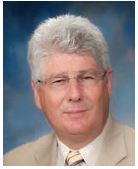

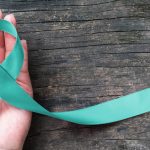
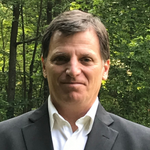

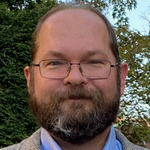

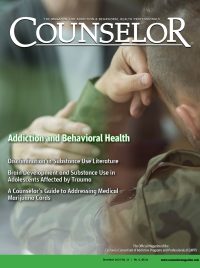




 Counselor Magazine is the official publication of the California Association of Addiction Programs and Professionals (CCAPP). Counselor offers online continuing education, article archives, subscription deals, and article submission guidelines. It has been serving the addiction field for more than thirty years.
Counselor Magazine is the official publication of the California Association of Addiction Programs and Professionals (CCAPP). Counselor offers online continuing education, article archives, subscription deals, and article submission guidelines. It has been serving the addiction field for more than thirty years.